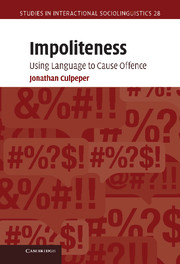Book contents
- Frontmatter
- Contents
- List of figures and tables
- Preface
- Introducing impoliteness
- 1 Understanding impoliteness I: Face and social norms
- 2 Understanding impoliteness II: Intentionality and emotions
- 3 Impoliteness metadiscourse
- 4 Conventionalised formulaic impoliteness and its intensification
- 5 Non-conventionalised impoliteness: Implicational impoliteness
- 6 Impoliteness events: Co-texts and contexts
- 7 Impoliteness events: Functions
- 8 Conclusions
- Notes
- References
- Index
Introducing impoliteness
Published online by Cambridge University Press: 16 May 2011
- Frontmatter
- Contents
- List of figures and tables
- Preface
- Introducing impoliteness
- 1 Understanding impoliteness I: Face and social norms
- 2 Understanding impoliteness II: Intentionality and emotions
- 3 Impoliteness metadiscourse
- 4 Conventionalised formulaic impoliteness and its intensification
- 5 Non-conventionalised impoliteness: Implicational impoliteness
- 6 Impoliteness events: Co-texts and contexts
- 7 Impoliteness events: Functions
- 8 Conclusions
- Notes
- References
- Index
Summary
Orientating to impoliteness
Let us begin by working through two brief examples. I will use these as a springboard for the array of impoliteness phenomena to be examined later in the book (I will not cite much supportive research here, but will do so in later chapters).
The first example is taken from my report data. It is a kind of diary report, with some reflective commentary, written by a British undergraduate (details of the methodology are given below). (Note: I make no attempt to ‘clean-up’ the data analysed in this book, and so there will be spelling errors and other infelicities.)
I was in a taxi with 5 other girls, on our way into town. The taxi driver seemed nice at first, commenting on how pretty we looked etc. Then he turned quite nasty, making vulgar sexual innuendos, swearing a lot and laughing at us. He then insulted some of us, commenting on the clothes we were wearing and when we didn't laugh, he looked quite angry. He then asked where we were from, we told him, and then he started criticising and insulting us and our home towns. We mostly stayed quiet, giving non-committal, single word answers until we could leave.
My informant commented that the taxi driver's behaviour was ‘sexist, rude, very offensive and inappropriate given the context’. Clearly, impoliteness behaviours are labelled in particular ways; impoliteness has its own metadiscourse. The behaviour is described as ‘rude’, a term that encompasses the semantic domain of impoliteness.
- Type
- Chapter
- Information
- ImpolitenessUsing Language to Cause Offence, pp. 1 - 18Publisher: Cambridge University PressPrint publication year: 2011

